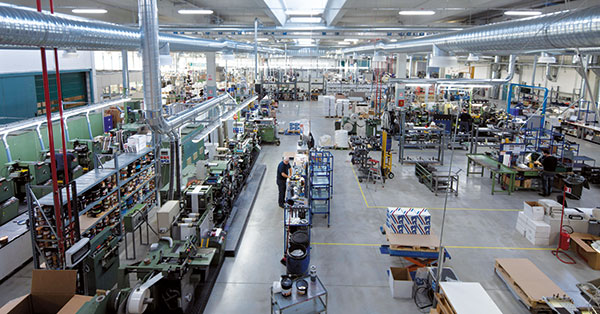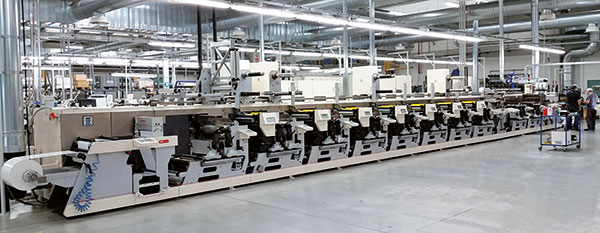Selfadhesive labels: virtuous models
FOCUS ON INNOVATION Shrewd “specialisation in everything”, strong R&D orientation (linerless and anti-counterfeit the latest new features), a paintaking market (and competitor) relations policy capable of ensuring more service to the users. Pilot is experiencing two digit growth on a market that is moving again. This too also in Italy. Elena Piccinelli
Companies are back to investing again and committing themselves to new projects, they are back to spending, also on the Italian domestic market. This is the first good piece of news. The second is that price is not the only decisive factor in purchasing decisions: after years of promotions and competitions, FMCG companies are back to finding ways of differentiating, also in packaging. And in labeling.
This consideration is made by Andrea Vimercati, second generation entrepreneur as well as general manage of Pilot Italia – one of the most dynamic and best-known Italian label producers, specialised in selfadhesive labels for various segments, from food & beverage to pharmaceuticals, from cosmetics to the automotive segment. A labeling works that is, as Vimercati says, “specialised in everything”, thanks to the skills and the experience not only in print materials and techniques, but also regarding the problems of packaging in the various applicative sectors. In other words, Pilot - despite the classic alternatives between generalist and specialist business - has been able to invent an original model, without a doubt demanding but is also giving them great satisfaction. «And if in the last financial year, also thanks to the economic recovery in the fourth quarter, we closed with a good balance, this year we are registering a truly consistent growth in turnover (+15%). Without calculating that the imminent installation of the new print line will lead to further growth opportunities».

Shelf appeal and environment, traceability and consumer safety... in FMCGs the R&D drivers are multiplying. But do they then turn into concrete projects? Is industry investing in new products?
Yes. In this moment we note an inclination to develop in all sectors. And more markedly abroad (Pilot’s exports are growing consequently, Ed.) but, at last, the demand for high added value products in Italy is also growing. The reason is simple: the multinationals that produce consumer goods, after years of extreme saving and promotional pricing, sense the risk of their offer as appearing as e flat and are back to feeling the need for novelties and setting themselves apart. This too in packaging.
To the detriment of sustainability?
No: there is no going back on the environment. And then again sustainability often has positive effects on the level of costs, that no one today can afford to ignore. As for example in the case of the replacement of secondary packaging (the carton)… that might be with fine multilayer label, precious, “distinctive” and, when it comes down to it, also more economical.
But cost saving, if not governed correctly, can lead to a compromise in terms of product protection and, hence consumer safety?
The risk is there no doubt but, according to me, it is more theoretical than real. In particular, on this ground we do not stoop to compromises: and not so much for the fact that we are ISO 9001 certified but because we have become experts in safety and we move consequently. In food labels for example, we only use “low migration” products and, more in general, we adopt the same standards demanded by the pharmaceutical sector for all applications. It is part of our idea of socially responsible enterprise and service towards the customer, and it is also coherent with our prospective vision: in my opinion, in the market as it is redefining itself in these years of change, only the companies that are capable of raising the bar of quality will continue to operate fully.

Hence your skills and competency are not “just” limited to the materials used to produce labels but, more in general, also cover the problems associated with different packaging: migration, set-off, barrier properties…
Exactly, and this is why we use the oxymoron, “specialists in everything”, everything that counts in the various applicative sectors: technical, normative, environmental and marketing aspects. In Pilot, 4 people work on quality control, a function strictly related to R&D. In fact, while we tackle a problem, we test new materials and solutions, we activate contacts with suppliers and we try to actively involve the customers. The results are highly satisfactory because our commitment is a stimulus for all, encouraging the exchange of information and reciprocal updates.
That is to say you are improving the communication between the various actors in the supply chain..
Yes, it is another aspect of the approach to entrepreneurship that is changing, enabling the overcoming of closure and mistrust that impair work quality. The reason why is clear: if I don’t know what material is being used on a line, and how it is being used, I cannot solve, and better still, prevent problems…
Meeting up personally undoubtedly facilities this process and generates faith; fairs like Interpack, from this point of view, are extremely precious.
As well as cooperation on single projects, do you have other opportunities for stable relations with the companies in the sector?
We frequent, with commitment, the international institutions (Andrea Vimercati was up to recently Finat president, Ed.). On top of that, along with the labelmakers Aro Group, Mida Etichette e Notarianni, we have set up a “business network” that also acts as a purchasing centre, with advantages in terms of cost containments.
We have signed a “back up” agreement with the German concern Schäfer Etiketten that enables us to give the necessary guarantees of supply, in the event of unforeseeable stops in production, this also to multinationals. It is a two way agreement between companies equipped with the same machines and technologies, that operate according to the same quality criteria and specifications.
How have you structured you machine yard?
We have all sections in the company: R&D, design, preprint, print and converting-finishing of the various types of selfadhesive labels. In the prepress area we devise the artwork with leading edge software, we then manage the entire workflow up to CTP applying painstaking quality controls.
As far as print is concerned, we have all technologies apart from digital because, up to now, we do not systematically do short runs, and if need be, we turn to faithworthy suppliers. In the company we have offset, flexo, typographical and screenprint machines, integrated in line with hot and cold embossing and finishing systems. We have activated a second, highly modern Gallus offset, and in this way we can work with 330 to 520 mm wide rolls. As well as that we are about to install a “Mo-4” 420 mm sleeve Nilpeter, that “travels” at 175 m/min. It is a true technological jewel, with cutting, flexo-, gravure and offset print units; hot and cold foil, hologram printing, lamination, relief printing that will increase our capacity to respond to the market.
Anticounterfeiting for pharma
Pilot has developed a new type of anti-counterfeiting and authentication system, devised for pharma but perfectly adaptable to other sectors, based on the use of several types of special inks. Pharma Authentication Seal responds to the safety and security needs of pharmaceutical product that, in the coming year, will have to comply with the new European norms, adopting specific “safety features”.
The Pilot system is based on a combination of visible (overt) inks, like color shift and thermochromic, and invisible (covert) inks. The latter can only be picked up via special equipment, and manifest themselves in the form of color, light or even sound. Chosen and combined according to objective specifications, they can be an effective tool for authentication, alternative to other more systems and more economical.



















